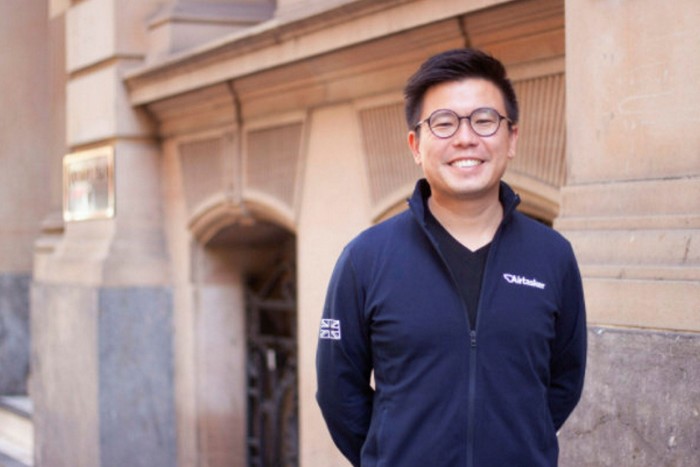
Australian app finds a market for spider-catchers
 Specialist expertise: ‘taskers’ on the platform take on various household jobs, such as assembling furniture, depending on their skills
Specialist expertise: ‘taskers’ on the platform take on various household jobs, such as assembling furniture, depending on their skills We’ll send you a myFT Daily Digest email rounding up the latest Gig economy news every morning.
Not many people would list “unafraid of spiders” on their CV. Yet, in Sydney, home of the world’s most venomous spider to humans, not being perturbed when asked to expel an unwanted arachnid is a skill that can be monetised.
Airtasker — an Australian online marketplace that connects people who need jobs done with cleaners, carpenters, gardeners and more — has found there is also a market for spider removalists, as opposed to full time fumigators.
A woman posted that she would pay A$35 to anyone that could immediately evict a large spider from her home. Within hours her post had been copied multiple times, and a niche industry was born.
For Tim Fung, founder and chief executive of Airtasker, the rise of the spider catchers is evidence of the sort of services that people did not realise they needed. “Certain skills are recognised but others aren’t,” he says. “But not being scared of spiders is a skill. Every single person has unique things that they can do.”
 Tim Fung: ‘Every single person has unique things that they can do’
Tim Fung: ‘Every single person has unique things that they can do’Specialist tasks — such as Ikea furniture assembly, Lego tuition and bathroom tap replacement — may seem niche but, in aggregate, have become lucrative sidelines for the “taskers”, and big business for the marketplace.
Fung gives the example of one tasker, known as the “Trampoline Whisperer”, who earns tens of thousands of dollars a year installing trampolines for parents wanting to surprise their kids, who are unwilling or unable to do it themselves.
The idea for Airtasker came in 2012, when Fung asked a friend to help him move house. That friend had a truck, normally used to transport frozen chicken nuggets. As he moved his chicken-scented possessions into his new home, Fung asked himself why he was roping in a reluctant friend to help — and why an eBay-like marketplace for odd jobs didn’t exist.
Ten years on, and Airtasker has 150,000 taskers that have served 1.2mn paying customers, taking it to 292nd place in the FT ranking of high-growth Asia-Pacific companies.
The value of the jobs booked through the ecommerce company since its inception is now A$1.1bn. From 2008 onwards, it has expanded into the UK, New Zealand, Singapore and the US, taking it into competition with near-rivals, such as US platforms TaskRabbit and Thumbtack.
More stories from this reportFT ranking: Asia-Pacific High-Growth Companies 2022
Asia-Pacific start-ups seize home growth amid travel shutdowns
‘I knew the future was ecommerce’: Great Deals CEO on topping FT ranking
Japan launches university fund to spur innovation
Bangalore keeps its crown as India’s high-growth tech hub
South Korean webtoon platform’s pitch for international fans
Strict lockdown measures in Australia during the pandemic hampered Airtasker’s progress as, in many places, its taskers were not allowed to enter people’s homes to do odd jobs. That hit its shares, which have halved in value since October.
But the company has started to recover since those measures were lifted. Airtasker’s revenue rose 10 per cent to A$13.9mn in the first half of this year and, although it remains lossmaking, it has raised its growth prospects for the year.
Fung’s journey into the world of start-ups was unusual. The Sydney-sider spent five years at Macquarie, the Australian bank and asset manager, but decided to switch careers. Having been a child model, he first joined a fashion agency in 2009. There, he encountered Peter O’Connell, a telecoms industry veteran who was setting up Amaysim, a virtual mobile network operator, and Fung joined in 2010 to get what he calls an “MBA in how to grow a start-up”.
The biggest criticism of Airtasker — similar to that levelled at other gig economy companies — is that the tasker is not paid adequately, compared with a fully-employed professional. Unions have argued that companies such as Airtasker are exploiting a subclass of workers.
The company uncovered a market for spider catchers, as opposed to full time fumigators
Fung admits the company was once guilty of focusing on building its customer base and not thinking of the taskers’ perspective. “If you think about Uber or Deliveroo, it’s very much ‘how do we make this cool customer thing’ and, ‘we’re going to have put a bunch of pressure on a bunch of riders and drivers to make that true’,” he acknowledges.
However, his company works with taskers with good reputations to avoid a race to the bottom. Fung says 70 per cent of jobs posted on the platform are not handed to the cheapest bid, indicating customers are willing to pay more for service quality.
He recalls watching Uber founder Travis Kalanick talking about how his company would make more money when autonomous cars were able to operate without a driver. Fung says it would be a bad thing for his company, and the taskers, if robots replaced human cleaners and other jobs.
Airtasker is also sometimes criticised by professionals who say their income has been undercut by enthusiastic amateurs, who take small bites — such as replacing a tap — out of their businesses.
But Fung does not expect Airtasker to replace household services such as plumbing or cleaning, despite competing with them for small jobs. He believes the value of Airtasker is in the “long tail of niche services” that will expand the overall size of household services, as people apply skills to small jobs — such as spider removal or getting a drone out of a tree.
With Airtasker, Fung hopes to make it easier for people to get these odd jobs done: “In five to ten years time we will look back and think ‘wasn’t it crazy that it was so hard?’”
{"focus":["25e135f2-882e-4202-b242-68ddc7942d4d","545de836-5a62-4bd3-bdc6-c9f9bfd32055","6b32f2c1-da43-4e19-80b9-8aef4ab640d7","a8f6ecb6-68b9-425d-b964-285100520b0d","06610896-2754-4847-a48f-9363d18a8c5e","29e67a92-a3b8-410c-9139-15abe9b47e12","6d93bd99-779d-490c-8250-2ff2e430439a","7ef5dd51-0ff2-4c7f-9ebb-4df5a301ef2a","82645c31-4426-4ef5-99c9-9df6e0940c00","876b1548-d95a-43a6-887a-35f041182664","c47f4dfc-6879-4e95-accf-ca8cbe6a1f69","e58e66fe-7cc6-4382-b781-1161bae8b905","ec4ffdac-4f55-4b7a-b529-7d1e3e9f150c"],"authorConcepts":["b615640c-414c-4ec4-ad78-e0c1ab91822b"],"displayConcept":"545de836-5a62-4bd3-bdc6-c9f9bfd32055"}Get alerts on Gig economy when a new story is published
Get alertsCopyright The Financial Times Limited 2022. All rights reserved.Reuse this content (opens in new window) CommentsJump to comments sectionPromoted ContentExplore the Special ReportREAD MOREFT High-Growth Companies Asia-PacificAsia-Pacific start-ups seize growth at home amid travel shutdowns
- Currently reading:Australian app finds a market for spider-catchers
- FT ranking: Asia-Pacific High-Growth Companies 2022
- Asia-Pacific start-ups seize growth at home amid travel shutdowns
- ‘I knew the future was ecommerce’: Great Deals CEO on topping FT ranking
- Japan launches university fund to spur innovation
- Bangalore keeps its crown as India’s high-growth tech hub
- South Korean webtoon platform’s pitch for global fans
- Disrupters Add to myFT
- Gig economy Add to myFT
- Technology sector Add to myFT
- Global outsourcing Add to myFT
- Nic Fildes Add to myFT
Owl Media Group takes pride in providing social-first platforms which equally benefit and facilitate engagement between businesses and consumers and creating much-needed balance to make conducting business, easier, safer, faster and better. The vision behind every platform in the Owl Media suite is to make lives better and foster a healthy environment in which parties can conduct business efficiently. Facilitating free and fair business relationships is crucial for any thriving economy and Owl Media bridges the gap and open doors for transparent and successful transacting. No advertising funds influence the functionality of our media platforms because we value authenticity and never compromise on quality no matter how lucrative the offers from advertisers may seem.
Originally posted on: https://www.ft.com/content/a8d8257d-4e6a-42e5-8f8f-c11441c1c685